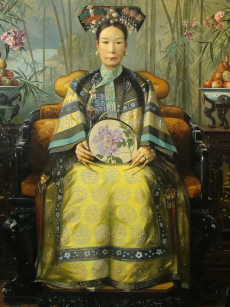_underwood_&_co_(restored)_(40728727097ef4a1dbc1be856832176da3d7d6aa3f.jpg)
The 1900 Boxer Rebellion was an anti-imperialist uprising towards the end of China’s Qing dynasty. It was initiated by the Militia United in Righteousness, who were known in English as the ‘Boxers’ because they practiced martial arts (pictured). Motivated by nationalist sentiments, the rebellion was fought in opposition to foreign imperialism and Christian military activity. However, the foreign ‘Great Powers’ intervened and defeated the uprising, which weakened the Qing dynasty and strengthened foreign influence.
Foreign influence in China had grown since the First (1839-1842) and Second (1856-1860) Opium Wars. Prior to these there had been a trade imbalance, in which there was a lot of Western demand for Chinese goods, but not the other way round, giving China an economic advantage. Opium, a narcotic drug derived from poppies in British-controlled India, was an exception. War broke out when China attempted to stop Britain from illegally importing the drug, by destroying large quantities of it. However, they suffered heavy defeats, and in a series of treaties Britain: seized control of Hong Kong; opened many ports for foreign trade; allowed foreign embassies in the capital Peking, modern Beijing; sanctioned Christian missionary activity; imposed religious freedom and legalised the import of opium. These came to be known as the ‘Unequal Treaties’ as Britain gave no concessions in return. Foreign communities were given privileged status in China, and were made exempt from the local laws, while missionaries were allowed to preach anywhere and build churches on any land.
There was conflicting official Chinese response to the situation. In June 1898, progressive Chinese officials, backed by Protestant missionaries, persuaded the Guangxu Emperor to institute a range of cultural, political and educational modernising reforms, including the implementation of democracy. This was strongly denounced by conservative elements of the ruling classes, who suspected a foreign plot. In September, there was a coup d’etat engineered by Empress Dowager Cixi (pictured), who took control over the government and banished the Emperor. On a lower level some citizens displayed increasing animosity towards foreigners, particularly Christian missionaries. In November 1898 a band of armed men stormed the residence of a German missionary and killed two priests. Somewhat prophetically this actually increased foreign influence, as Germany responded by seizing Jiaozhan bay, gaining a 99-year rent-free lease.

The Big Sword Society were a secret group who attacked Catholic churches and villages, and are believed to have been responsible for the murder of the two priests. Another such group was The Righteous and Harmonious Fists in the Shandong region. They attempted spirit possession, whirling swords and chanting to Taoist and Buddhist spirits, and practiced martial arts, earning them the English name ‘Boxers’. They believed that through training, diet and prayer they could eventually become resistant to canons, rifle shots and knife attacks, and that spirits soldiers would descend from heaven to assist them in purifying China of foreign oppression. Membership of the group was attractive to young, unemployed, powerless village men, especially after droughts and then floods occurred in 1897 and 1898.
In October 1898 a group of Boxers attacked the Christian community of Lijuatan Village where a temple to the Jade Emperor, the first god in traditional religions, had been converted into a church. It was here that they first used the slogan “Support the Qing, destroy the foreigners.” A year later they renamed their group to the ‘Militia United in Righteousness,’ in order to distance themselves from outlawed martial arts sects, and continued to attack foreign and Christian communities. In January 1900 Empress Cixi changed the official policy of suppressing such groups, and instead issued edicts in the Boxers’ defence. The movement began to spread north towards Peking, burning churches and attacking Chinese Christians on the way. On 30th May the British Minister to China, Claude Maxwell MacDonald, requested foreign soldiers come to Peking to defend their embassies. Soon 435 troops from eight nations: France, Russia, Britain, the United States, Germany, Italy, Japan and Austria arrived to defend their respective missions. When further troops arrived on the 10th June, this angered the Imperial Court. The pro-Boxer Prince Duan replaced Prince Qing, who favoured reconciliation, as leader of the foreign office and ordered the Qing imperial army to attack the forces.
On the 11th Boxers were seen in the Legation, or embassy, Quarter of Peking. When one was captured and executed by German troops, thousands of Boxers burst into the city in response, proclaiming their slogan and burning churches with live victims inside. Around 500 foreign civilians, 400 soldiers and 3000 Chinese Christians sought refuge in the Legation Quarter. On the 18th Empress Cixi began to blockage the legations, and sent an ultimatum that all diplomats and foreigners were to leave Peking within 24 hours. However, soon after her declaration a German envoy was killed in the street, and so those in the legations were too scared to leave, and instead began to fortify the buildings. By the 20th the embassies were under siege by both the Qing Army and the Boxers, and on the 21st the Empress declared war on all foreign powers.
On the 17th July an allied force of 20,000 troops from the eight nations had landed, and by the 14th August they had defeated the Imperial Army and captured Peking. The capital was looted, with auctions of the looted items held at the British embassy, and both suspected Boxers and innocent civilians were killed. On the 7th September the ‘Boxer Protocol’ saw the execution of ten high-ranking officials linked to the rebellion, though Empress Cixi had managed to escape before the troops had reached Peking. Reparation payments of 450 million taels of silver were to be paid to the eight nations over 39 years, more than the government’s annual income. Foreign troops were posted in Peking, and China was prohibited from importing arms for two years.
Images:
https://upload.wikimedia.org/wikipedia/commons/thumb/3/3d/Boxer_Prisoners_Captured_By_6th_US_Cavalry%2C_Tientsin%2C_China_%281901%29_Underwood_%26_Co_%28RESTORED%29_%284072872709%29.jpg/800px-Boxer_Prisoners_Captured_By_6th_US_Cavalry%2C_Tientsin%2C_China_%281901%29_Underwood_%26_Co_%28RESTORED%29_%284072872709%29.jpg
http://2.bp.blogspot.com/-eoxf0hBUBWs/VInF7dRL1xI/AAAAAAAAEqw/220Ypeq7-48/s1600/empress_full.jpg

0 Comment:
Be the first one to comment on this article.